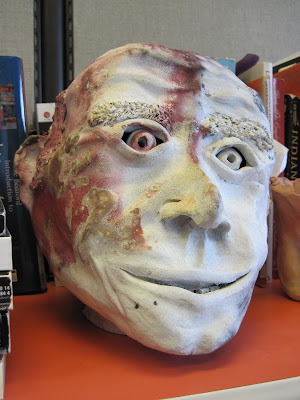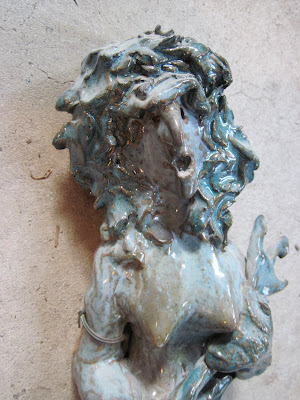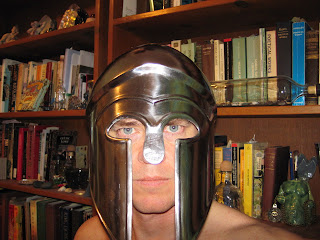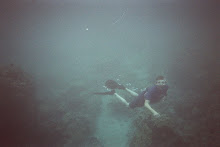Or, CLASSICAL DOGGEREL (circa 1995)
And "doggerel" means fairly bad poetry, or wannabe poetry, or something that looks a bit like poetry, but isn't quite. I've written my share of sea-doggerel. Here's a piece of classical doggerel from an old notebook . . . though at the bottom of the blog-entry, there's a chorus from a really cool dysfunctional would-be love-song: "Rome Fell."
NOR SWIMS*
Neither reads
A fool the old
Roman gibe
But Caesar
Swam, wrote
Books, scrolls
Historical, political
Who knew
The Rubicon, the die
Once only, but cowards
Cleopatra loved
Egyptian grain
Against odds
King Nicomedes
Too, but after
Laurels, bald
Truths too few
Posterity, can't
Plan for it:
Paine's idea,
Burke agreed.
Julius, wily
Julius: he
Flourished
For a while.
--I just found this doggerel in an old notebook from grad school, the notebook itself entitled "Dioscuri" and dated "1995." I've lightly edited this piece, something that had grown out of my reading in Julius Caesar, of course, but Byron too--however unnamed--as well as Shakespeare, Talbot Mundy, English Romantic era political theory, and Roman history. Barton's Sorrows of the Ancient Romans is probably the source of the Roman proverb, the Roman definition of a fool*--He neither reads nor swims--which I've presented previously here.
About that time I also wrote a song called "Rome Fell," but I can't quite recall nor find those old lyrics.
I can sing the chorus for you:
ROME FELL
Like I fell for you
ROME FELL
You can walk through the ruins
ROME FELL
Empires never last
ROME FELL
Who cares about the past?
(REPEAT!)
(REPEAT!)
Saturday, April 28, 2012
Roman Holidays?
Labels:
Cleopatra,
doggeral,
Fool,
Graduate School,
Julius Caesar,
Poetry,
Reading,
Romans,
Romantic,
Swimming
Archilochos: "The Ant Bites!"
"The good natured need no cutlery
in their vocabulary."
Really, Archilochos?
Poet and warrior, mercenary, that you are?
The Stinging Wasp--the Biting Ant--of the ancient Greek world?
Aren't you the man who said . . .
"Listen to me cuss."
and, ferociously, gleefully,
"Meet insolence with outrage."
Well, how about two of your more moderated reminders?
"The heart of mortal man,
Glaukos, son of Leptines,
Is what Zeus makes it,
Day after day,
And what the world makes it,
That passes before our eyes."
and
"A man, Aisimides, who listens
To what people say about him
Isn't ever going to be quiet of mind."
True, both true, but sometimes we do need the lash of wit, the sting of indignation:
"The arrogant
puke pride."
"You drink a lot of unmixed wine
That you haven't paid for,
And weren't invited to share,
Treating everybody as your dearest friend,
Greed having supplanted any shame
You once had."
And, in the case of your back-stabbing prospective father-in-law, Archilochos, sometimes a full-scale curse is everything that's needed:
"May he lose his way on the cold sea
And swim to the heathen Salmydessos,
May the ungodly Thracians with their hair
Done up in a fright on the top of their heads
Grab him, that he know what it is to be alone
Without friend or family. May he eat slave's bread!
And suffer the plague and freeze naked,
Laced about with the nasty trash of the sea.
May his teeth knock the top on the bottom
As he lies on his face, spitting brine,
At the edge of the cold sea, like a dog.
And all this it would be a privilege to watch,
Giving me great satisfaction as it would,
For he took back the word he gave in honor,
Over the salt and table at a friendly meal."
-Archilochos
from Guy Davenport's 7 Greeks,
A New Directions Book: New York, 1995.
My best Archilochos impression . . . .
Friday, April 27, 2012
Bolinas Surf Shop Booty
The best sea t-shirts around may be found down almost at the end of Wharf Road.
Cash only, so come prepared.
Kids sizes too.
Thursday, April 26, 2012
Puck: Mask--Rough Draft
Rough draft of a Puckish mask:
sculpture mix; nutmeg glaze base with a deep blue/green glaze overlay (though the nutmeg base brought out more of the topcoat's green).
The straight edge of the glazing isn't what I'd prefer.
The brow markings are from rosemary sprigs, which seems appropriate.
I'll have to try again this summer.
Mask: Summer 2010?
Sunday, April 22, 2012
Archilochos: Grains of Salt
Three Pieces from Archilochos, the ancient Greek poet, translated by Guy Davenport:
With ships so trim and narrow,
Ropes fast and sails full,
I ask of the gods that
Our comrades have a wind too,
That they meet neither tall wave
Nor reef.
All fortune be with them.
Let us hide the sea-king's gifts,
The wrecked dead Poseidon brings.
Their lives
Held in the arms
Of the waves.
--Archilochos
from Guy Davenport's 7 Greeks,
A New Directions Book: New York, 1995.
(I've posted shots of this sculpture in the past here.)
Jolly Roger
"House-pirate."
"House . . . pirate? What's that?"
"Focused sublimation, I think."
"Aaaarrrgggghhhh. Isn't there something easier?"
"We wouldn't want there to be any real trouble . . . ."
Saturday, April 21, 2012
"There Is A Tide In The Affairs of Women . . ."
--Byron's opening to Canto VI of Don Juan:
'There is a tide in the affairs of men
Which taken at the flood'--you know the rest,
And most of us have found it, now and then;
At least we think so, though but few have guessed
The moment, till too late to come again.
But no doubt every thing is for the best--
Of which the surest sign is in the end:
When things are at the worst they sometimes mend.
There is a tide in the affairs of women
'Which taken at the flood leads'--God knows where.
Those navigators must be able seamen
Whose charts lay down its current to a hair;
Not all the reveries of Jacob Behmen
With its strange whirls and eddies can compare:--
Men with their heads reflect on this and that--
But women with their hearts or heaven knows what!
And yet a headlong, headstrong, downright she,
Young, beautiful, and daring--who would risk
A throne, the world, the universe, to be
Beloved in her own way, and rather whisk
The stars from out the sky, than not be free
As are the billows when the breeze is brisk--
Though such a she's a devil (if that there be one)
Yet she would make full many a Manichean.
Thrones, worlds, et cetera, are so oft upset
By commonest Ambition, that when Passion
O'erthrows the same, we readily forget,
Or at the least forgive, the laving rash one.
If Anthony be well remembered yet,
'Tis not his conquests keep his name in fashion,
But Actium, lost for Cleopatra's eyes,
Outbalance all the Caesar's victories.
He died at fifty for a queen of forty;
I wish their years had been fifteen and twenty,
For then wealth, kingdoms, worlds are but sport--I
Remember when, though I had no great plenty
Of worlds to lose, yet still, to pay my court, I
Gave what I had--a heart:--as the world went, I
Gave what was worth a world; for worlds could never
Restore me those pure feelings, gone for ever.
--Lord Byron
Minerva, Mermaid: sculpture mix: sea foam glazing; copper wire.
When In Rome . . .
There is a tide in the affairs of men
Which, taken at the flood, leads on to fortune;
Omitted, all the voyage of their life
Is bound in shallows and in miseries.
On such a full sea are we now afloat,
And we must take the current when it serves
Or lose our ventures.
------------William Shakespeare, Julius Caesar (4.3)
The character Brutus is speaking.
Never let the future disturb you.
You will meet it, if you have to,
with the same weapons of reason
which today arm you against the present.
------------Marcus Aurelius, Meditations: Book VII
(Staniforth translation)
The gladiator takes his counsel in the sand.
------------old Roman proverb
(Barton translation)
Which, taken at the flood, leads on to fortune;
Omitted, all the voyage of their life
Is bound in shallows and in miseries.
On such a full sea are we now afloat,
And we must take the current when it serves
Or lose our ventures.
------------William Shakespeare, Julius Caesar (4.3)
The character Brutus is speaking.
Never let the future disturb you.
You will meet it, if you have to,
with the same weapons of reason
which today arm you against the present.
------------Marcus Aurelius, Meditations: Book VII
(Staniforth translation)
The gladiator takes his counsel in the sand.
------------old Roman proverb
(Barton translation)
Labels:
Advice,
Brutus,
Gladiator,
Julius Caesar,
Marcus Aurelius,
Romans,
Shakespeare
Talking About Byron
"I Leave The Thing a Problem, Like All Things":
The Example of Byron
A suggestive, representative introduction to the life, the work, the letters, and the irrepressible voice of George Gordon, Lord Byron--with reference to certain enduring critical problems and promising perspectives that ought to arise when you delve deeply into the English Romantic Period's Most Popular, Most Topical, and Greatest Poet.
That's the talk I gave yesterday afternoon.
An "overstuffed yakfest" is how I summed it up later, but I think a good time was had by most, if not all. I hope so. I had a great audience, certainly, and I provided visual aids, thick handouts, enthusiasm, and as much humor as I could pack in between quotations. While quoting, I can let Byron provide the humor, the satire, or the pathos--and sometimes all three in the same line.
Of course, giving a talk often shows you the better, more focused talk you should have given, but that's for next time. (I should make those notes on focal points and put them in the file . . . .)
Here's the quotation I meant to put up on the board as part of that better focus:
But words are things, and a small drop of ink,
Falling like dew upon a thought, produces
That which makes thousands, perhaps millions, think.
---------Lord Byron,
from Don Juan, Canto III, stanza 88
Monday, April 16, 2012
Sunday, April 15, 2012
Dream-Return

Rudi's been dead now three and a half years, but last night he visited me in a dream, that big old happy self doing his same old tricks. Felt really good.
Rudi would have been seventeen on April Fool's Day.
I've dreamed recently of my father and my friend Keith, both deceased, and in the dreams they were very much alive, very much going about fairly mundane tasks. Those dreams felt good too. Waking has had its own sorrows, sure, but the dreams felt good.
I can't recall in which poem just now, but Carolyn Kizer wrote words that I find comforting and haunting, puzzling and promising:
I dream of the dead,
Kind, brilliant, and comforting.
The lost return to us
When we are lost.
Saturday, April 14, 2012
"Et Tu, Brute"

 Julius Caesar: sculpture mix, pit-fired. 1999? 2000?
Julius Caesar: sculpture mix, pit-fired. 1999? 2000?This may be the ugliest piece of claywork I've produced, and it is the second (of seven or eight) full-sized heads I've made, the first without teacherly supervision, and you can see the rookie mistakes in the flatness of the face, the buggy eyes, and so forth.
The great thing about pit-firing, especially for a beginner like me at the time, is that you just don't know how the piece will turn out, which colors and where. I had hoped for a more thorough blackening effect, but what I got was post-assassination theatrics.
I like to bring this head into the classroom while teaching Shakespeare's Julius Caesar, just as a reminder in Acts 4 and 5 . . . .
Hail, Caesar!
Friday, April 13, 2012
"Car 54, Where Are You?"
 This is a gift from a student on the eighth anniversary of my father's death. This student has lost his father as well, quite recently.
This is a gift from a student on the eighth anniversary of my father's death. This student has lost his father as well, quite recently. We've been reading Ebbesmeyer and Scigliano's Flotsametrics and the Floating World in class, which features plastic ducks and other toys (among other things) caught in the Pacific gyres . . . .

Thanks, B.B.
Thursday, April 12, 2012
Mourning Coffee
I was going to wear a tie today to honor this eighth anniversary of the loss of my father. However, he hated to wear a tie, so I decided to skip the tie and just wear one of his favorite sport coats instead. I'm not sure how I ended up wearing the old jeans with coffee stains (something I wouldn't normally wear to teach in), but I recall him spilling his coffee in his truck almost every time I rode with him, so maybe his spirit was with me this morning.
Tuesday, April 10, 2012
Style Tips from Kirk Russell
Kirk Russell's A Killing in China Basin is a fairly recent crime novel set in San Francisco, and I'd like to recommend it to you. There's an engaging central character--veteran homicide inspector Ben Raveneau--compelling supporting characters, a handful of suspects, and the City By The Bay. There are many crime novels and mysteries set in San Francisco, but this one has Inspector Raveneau and, significantly, an unassuming energy that builds and builds, a steady relentlessness that should engage and provoke you to read further and further.
Rather than offer a summary or even a teaser about the central concerns of the novel, I am going to share a taste, a sense of the texture. With this second reading of Russell's novel, I'm most struck by the rich characterization; the spare, focused descriptions; and the interplay between the characters, captured in dialogue and in silence, in what's unsaid. This passage, however, offers an entry into the main character's evolving sense of self and humility through a reflection on clothing, on what to wear to work.
(La Rosa is Raveneau's new partner, a much younger rising star in the department.)
Like a true cop, La Rosa read the arrest article first, and he made coffee. Though it was Saturday and the office empty but for one interview underway, la Rosa had dressed in a coffee-colored suit and shoes to match. Maybe that was for an anticipated meeting with Lafaye, but who knew whether Lafaye was even in town. He got the impression from the website and everything else that popped up on Google that Lafaye traveled a lot. Seeing her nice clothes reminded him of a period of several years when he'd worn nice suits every day and told people that it was out of respect for the dead.
But that respect for the dead had also coincided with when he was most full of himself. Looking back now, he figured he'd known a few very good inspectors and some very bad ones and the clothing hadn't made anyone better or worse. Some of the bad inspectors had dressed immaculately yet couldn't find a soldier on an army base.
The good ones connected to some pulse running through everyone. One of the very best had taken him aside at a retirement party and walked him out into a warm May night on a patio to tell him, 'Dump the expensive suits, you don't need them. I've been watching you and you're the real deal, but you're missing details because you're spending too much time trying to keep coffee off your tie.'
At some point after trying to live larger than he was, Raveneau had figured it out. He sipped the coffee now . . . .

Kirk Russell, A Killing in China Basin, Severn House Publishers, Ltd: Sutton, Surrey, England, 2011--from pages 77-78.
I've just ordered the second Ben Raveneau thriller: Counterfeit Road.
Kirk Russell is also the author of four John Marquez eco-crime novels, and I recommend those books highly. In fact, Shell Games is a particular favorite; that novel begins with murder and abalone poaching on the northern California coast . . . .
Postscript:
The badge isn't quite right to fit the story, as it's a sergeant's badge, #1, for the City of Richmond, not an inspector's badge, not for San Francisco. That's my dad's badge, the retirement version earned through thirty years of service.
This Thursday will be the eighth anniversary of his death. Rest easy, Dad, rest easy.
Labels:
Crime novels,
John Marquez,
Kirk Russell,
Raveneau,
San Francisco
Monday, April 9, 2012
Mermaid in Exile



 One of the first half-dozen mermaids I've made. Sculpture mix; blue, green, and grey glazing.
One of the first half-dozen mermaids I've made. Sculpture mix; blue, green, and grey glazing. I considered cleaning the dust off her, but held off. That's her fate, garage-bound. I dream of attaching her to a wharf piling and seeing if barnacles and other intertidal creatures would bond with her, but I haven't followed through on the vision.
Aside from that broken trident, she's all one hunk of clay, hair included, pulled into shape less from a sense of greater structural integrity (which she has), but more from a lack of knowledge (at the time) of how to sculpt and put together figures. All of my pieces back then were made from one hunk of clay in whatever time it took to give the figure a shape, often quite rough, before the clay became too dry, too stiff, too worked over.
She's definitely mannish, but that's how she looks. She's a warrior of the sea. I like fierceness, the Amazon face, and I like strong noses in general, anyway.
She doesn't have a name. Or, she's never gifted me with her name.
Perhaps she's too far from the water to speak such an intimacy.
Sunday, April 8, 2012
Water White as Ghosts
Saturday, April 7, 2012
Moya Cannon: "Isolde's Tower, Essex Quay"
It is our fictions which make us real.
--Robert Kroetch
Is there no end
to what can be dug up
out of the mud of a riverbank,
no end
to what can be dug up
out of the floodplains of a language?
This is no more
than the sunken stump
of a watchtower on a city wall,
built long after any Isolde might have lived,
built over since a dozen times,
uncovered now in some new work--
a tower's old root in black water
behind a Dublin bus stop;
and the story is no more than a story.
Tristan drifted in here on the tide to be healed,
taken in because of his music,
and a long yarn spun on
of which they'd say--
Had not the lovers of whom this story tells
Endured sorrow for the sake of love
They would never have comforted so many.
Friday, April 6, 2012
Moya Cannon: "'Taom'" and "Hazelnuts"
'TAOM'
The unexpected tide,
the great wave,
uncontained, breasts the rock,
overwhelms the heart, in spring or winter.
Surfacing from a fading language,
the word comes when needed.
A dark sound surges and ebbs,
its accuracy steadying the heart.
Certain kernals of sound
reverberate like seasoned timber,
unmuted truths of a people's winters
stirrings of a thousand different springs.
There are small unassailable words
that diminish caesars;
territories of the voice
that intimate across death and generation
how a secret was imparted--
that first articulation,
when a vowel was caught
between a strong and a tender consonant;
when someone, in anguish
made a new and mortal sound
that lived until now,
a testimony
to waves succumbed to
and survived.
*'Taom' is an Irish word which means "an overwhelming wave of emotion"
--Moya Cannon,
from Oar,
Salmon Publishing, Bridge Mills, Galway, Ireland.
1994.
HAZELNUTS
I thought that I knew what they meant
when they said that wisdom is a hazelnut.
You have to search the scrub
for hazel thickets,
gather the ripened nuts,
crack the hard shells,
and only then taste the sweetness at wisdom's kernel.
But perhaps it is simpler.
Perhaps it is we who wait in thickets
for fate to find us
and break us between its teeth
before we can start to know anything.
--Moya Cannon,
from The Parchment Boat,
The Gallery Press, Loughcrew, Oldcastle, County Meath, Ireland.
1997.

Tuesday, April 3, 2012
Identikit
Water, salt;
paper, bound;
clay, wet;
forest, kelp;
beach, jade;
whiskey, Irish;
friends, true.
--April 9, 2008
I just rediscovered this note on a bulletin board in my office. Old notes can pull you into the labyrinth of the past, much like anything -- perhaps everything -- else. (Amongst a myriad of landmarks and turnings, Keith was still alive, for example.) I do have "Identikit" posted in the column to the right, but I realized that this doggerel of self-description lacked a specific place in the body of the blog.
paper, bound;
clay, wet;
forest, kelp;
beach, jade;
whiskey, Irish;
friends, true.
--April 9, 2008
I just rediscovered this note on a bulletin board in my office. Old notes can pull you into the labyrinth of the past, much like anything -- perhaps everything -- else. (Amongst a myriad of landmarks and turnings, Keith was still alive, for example.) I do have "Identikit" posted in the column to the right, but I realized that this doggerel of self-description lacked a specific place in the body of the blog.
As Keats said in a fragmentary identikit of his own, "See here it is -- I hold it towards you."
Sunday, April 1, 2012
John Montague's "The Fight"
THE FIGHT
When I found the swallow's
Nest under the bridge--
Ankle deep in the bog stream,
Traffic drumming overhead--
I was so pleased, I ran
To fetch a school companion
To share the nude fragility
Of the shells, lightly freckled
With colour, in their cradle
Of feathers, twigs, earth.
It was still breast warm
Where I curved in my hand
To count them, one by one
Into his cold palm, a kind
Of trophy or offering. Turn-
Ing my back, to scoop out
The last, I heard him run
Down the echoing hollow
Of the bridge. Splashing
After, I bent tangled in
Bull wire at the bridge's
Mouth, when I saw him take
And break them, one by one
Against a sunlit stone.
For minutes we fought
Standing, and falling in
The river's brown spate,
And I would still fight
Though now I can forgive.
To worship or destroy beauty--
That double edge of impulse
I recognize, by which we live;
But also the bitter paradox
Of betraying love to harm,
Then lunging, too late,
With fists, to its defense.
--John Montague
Subscribe to:
Posts (Atom)
























